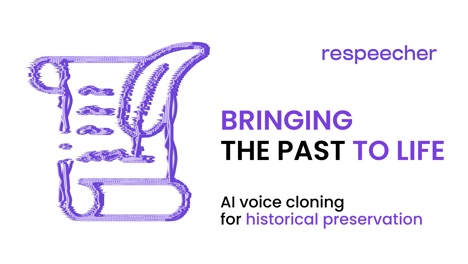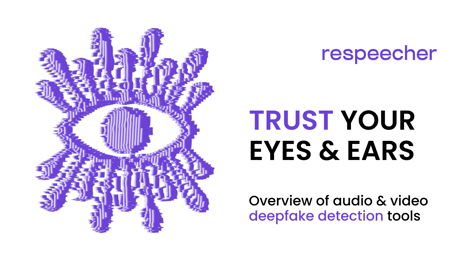How Voice Cloning Ensures Anonymity in Witness Protection

While voice cloning has many applications, one area where it can immediately impact people’s lives is witness protection. By using AI voice cloning to protect the anonymity of a witness, law enforcement can safeguard their identity and prevent retaliation while still allowing them to provide critical testimony in legal proceedings.
In this article, we will explore the different components of witness protection and discover the benefits and challenges of using voice cloning technology to safeguard anonymity.
The rights of witnesses and criminal procedures
Witnesses have certain rights in legal proceedings designed to protect their safety, ensure the anonymization of data and their participation in the legal process, and preserve their credibility as witnesses. Some of the key witness rights include:
- The right to be treated with respect and dignity. Witnesses have the right to be treated with respect and dignity by all parties involved in the legal process.
- The right to be informed. Witnesses have the right to be informed about the legal process and their role in it, including their rights and obligations as witnesses.
- The right to protection. Witnesses have the right to be protected from harm or retaliation as a result of their testimony.
- The right to privacy. Witnesses have the right to have their personal information and identity protected, including through the use of witness anonymity orders or other measures.
These witness rights are important for ensuring that witnesses are able to fully and safely participate in legal proceedings and for protecting their credibility as witnesses. By upholding these rights and ensuring that witnesses are treated fairly and with respect, we can participate in the process of establishing greater confidence in the legal system and a more just and equitable society.
Witness protection and anonymity
Witness protection refers to the range of measures that ensure the safety and security of witnesses who may be at risk of harm or retaliation for their cooperation with law enforcement or the justice system. These measures can include relocation to a different city or country, establishing a new identity, and round-the-clock security.
On the other hand, witness anonymity refers to the practice of concealing a witness's identity in court proceedings to protect them from retaliation or other forms of harm. This can involve measures such as using pseudonyms or initials instead of the witness's real name, shielding the witness from public view, or using AI voice cloning technology to alter a witness's voice.
The decision to grant witness anonymity is typically made by a judge or other legal authority and is based on carefully considerating the potential risks to the witness and the importance of their testimony to the case.
Both witness protection and anonymity are important tools for giving witnesses the safety and security they need to provide adequate testimony or act as sufficient evidence in legal proceedings. Removing the threat of harm or retaliation can help to encourage witnesses to come forward and provide the information that is necessary for successful prosecutions.
After the trial, witness protection measures may continue, especially if there is an ongoing risk to the witness or their family. In some cases, witnesses may need to be relocated to a new area or even a new country in order to ensure their safety. Witnesses may also be given ongoing security and other forms of support, such as counseling or financial assistance.
How AI voice cloning ensures witness anonymity
Changing someone's voice is a process that is more complicated than other aspects of safeguarding witness anonymity. Voice plays a key role in the judicial process and can be difficult to alter convincingly.
AI voice generators offers a solution to this problem by allowing witnesses to testify using a computer-generated voice that is completely different from their own. This would make it much more difficult for anyone to identify a witness based on their voice alone while still allowing them to provide credible testimony.
There are some potential challenges and limitations to using voice changers for witness protection. For example, not all voice cloning software allows for creating an AI generated voice that is truly indistinguishable from a human voice, particularly in more complex or emotional contexts. However, Respeecher offers technology for witnesses to give legal testimony using an AI voice that's both distinct from their own and indistinguishable from a human voice.
In other words, Respeecher can change a witness's voice, keeping their anonymity intact while retaining all of their emotions, affections, and expressions. So how does it work?
- Choose any voice from Respeecher’s Voice Marketplace. Every voice is anonymous and copyright-free. Or, you can use the voice of any other person who volunteers to act as a target voice speaker.
- Respeecher’s system will analyze the source voice recording (the voice of the witness) and transform it into the target speaker’s voice you have chosen.
- As a result, you get a completely anonymous recording that reflects the emotional impact and intonations of the source voice.
At Respeecher, we guarantee:
- Complete anonymity of the source speaker (even we do not know whose voice we are cloning, as identity verification is unnecessary)
- Upon request, we will remove all voice samples of the source speaker from our systems
- Security of information when working on this or that anonymization project
In addition to providing anonymity, Respeecher could also help to overcome language barriers and other communication challenges that may arise in legal proceedings. For example, it could be used to create translations of testimony in real-time, allowing witnesses to speak in their native language while still being understood by those who speak a different language.
Although there are limitations and challenges to using AI voice cloning technology in witness protection, Respeecher provides a valuable tool for ensuring the safety and anonymity of victims and witnesses in legal proceedings. By combining Respeecher with other forms of witness protection, a more comprehensive means of protecting those at risk of retaliation may be possible, as we are only beginning to explore the field of voice synthesis for this purpose.
FAQ
AI voice cloning helps witnesses provide testimony without revealing their identity by changing their voice, keeping voice anonymity intact with the emotional genuineness of their testimony. Respeecher technology ensures the cloned voice sounds natural, which helps in witness protection and avoiding potential threats.
Voice anonymity could be challenging to achieve since voice recognition technology is delicate to subtle voice characteristics. AI voice cloning has to replicate the emotional and expression components of the original voice while following security. Voice alteration could sometimes not fully mask the identity unless done properly.
Respeecher technology uses advanced AI voice generators to change the voice of a witness without losing native emotional expressions, tone, and intonation. This allows witnesses to testify credibly while maintaining voice anonymity and security during legal testimony.
Yes, Generative AI and AI voice cloning technology like Respeecher can be employed to overcome language barriers in courts. Voice modification can facilitate the giving of evidence by witnesses in their native language but maintain voice anonymity and intelligibility for other court participants.
Respeecher technology offers voice anonymity through the erasure of all source voice samples upon use. The platform maintains confidentiality of information since it does not store personal information and operates at high AI ethics levels to protect the privacy of all parties involved.
One pitfall of AI voice cloning in court testimony is that the cloned voice will not always perfectly convey the emotional depth of the source speaker in emotionally charged or nuanced testimony. Respeecher technology does try to preserve such aspects, although it still has trouble with some cases.
Voice alteration via AI voice cloning protects witnesses from retribution and identification, enhancing their security and privacy. The anonymity ensures that they are able to provide information safely to contribute to legal proceedings, especially in sensitive cases of witness protection.
Further advancements in speech anonymization technology, the removal of language hurdles, and the support for live voice alteration for testimony are all part of the future of protecting witnesses from AI voice cloning. Technology will eventually be able to give witnesses even greater ease and security without sacrificing the reliability of their testimony.
Glossary
Voice anonymity
Witness protection
Legal testimony
AI voice generators
Anonymization technology

- voice cloning
- artificial intelligence
- AI voice synthesis
- artificial intelligence (AI)
- voice cloning technology,
- AI voice
- voice cloning software
- witness protection
- Respeecher
- Respeecher’s synthetic voices
- AI technology
- Respeecher Voice Marketplace
- AI voice cloning
- voice changer
- AI generated voice
- AI voice cloning software





